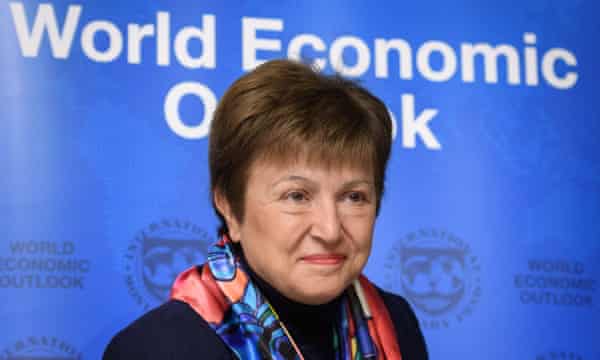IMF cuts global economic forecast as pandemic ‘hobbles’ growth
Fund chief Kristalina Georgieva says most serious obstacle to full recovery remains Covid vaccine divide between rich and poor states

The head of the International Monetary Fund has warned the world economy remains “hobbled” by the Covid-19 pandemic as she revealed her organisation has revised down its forecast for global growth this year.
Kristalina Georgieva, the IMF’s managing director, said the most serious obstacle to a full recovery was the vaccine divide between rich and poor nations and warned the global economy could suffer a cumulative $5.3tn loss over the next five years unless it was closed.
Speaking ahead of the IMF’s annual meeting next week, Georgieva called on rich countries to make good immediately on their pledges to share stockpiles of vaccines with developing countries.

“We face a global recovery that remains hobbled by the pandemic and its impact,” she said. “We are unable to walk forward properly – it is like walking with stones in our shoes!
“The most immediate obstacle is the ‘great vaccination divide’ – too many countries with too little access to vaccines, leaving too many people unprotected from Covid.”
In July, the IMF predicted 6% growth for the global economy in 2021, but Georgieva said this would be scaled back in new forecasts to be published in next week’s World Economic Outlook.
After a summer hit by supply-chain bottlenecks and rising inflationary pressures, the IMF chief said momentum in the US and China – the world’s two biggest economies – was slowing.
Although next week’s outlook will still predict a strong bounceback from the decline in global output seen in 2020, Georgieva said “the risks and obstacles to a balanced global recovery have become even more pronounced: the stones in our shoes have become more painful”.
Low-income nations were being hit by a combination of limited access to vaccines and a lack of the policy firepower deployed by rich nations to cope with the economic impact of the virus.
Georgieva said the divergence in economic fortunes was becoming “more persistent”, adding that while output in advanced economies was projected to return to pre-pandemic trends by 2022, it would take many more years for emerging and developing countries to recover.
“We can still reach the targets put forward by the IMF, with the World Bank, World Health Organization and World Trade Organization, to vaccinate at least 40% of people in every country by the end of this year, and 70% by the first half of 2022,” the IMF managing director said.
“But we need a bigger push. We must sharply increase delivery of doses to the developing world. Richer nations must deliver on their donation pledges immediately. And, together, we must boost vaccine production and distribution capabilities; and remove trade restrictions on medical materials.
“In addition to vaccines, we must also close a $20bn gap in grant financing for testing, tracing, and therapeutics. If we don’t, large parts of the world will remain unvaccinated, and the human tragedy will continue. That would hold the recovery back. We could see global GDP losses rise to $5.3tn over the next five years.”
With the COP26 conference in Glasgow, Scotland, a month away, Georgieva said fighting climate change was critical. She called for robust carbon pricing, much higher green investment and support for the most vulnerable.
A successful green transition could raise global GDP by 2% this decade and create 30m new jobs, she added.